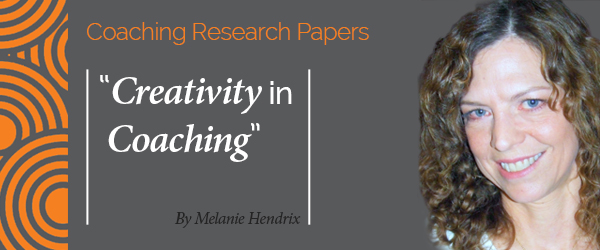Research Paper By Melanie Hendrix
(Transformation Coach, UNITED STATES)
Introduction
The purpose of this paper is to discuss creativity and right brain thinking skills as they relate to the coaching process. The premise of this paper is that the most effective coaching integrates right and left brain skills to promote whole brain thinking for the client and the coach. This paper suggests best practices for coaches to develop themselves, as well as several methods to develop and exercise right brain skills for more effective whole brain thinking in both coaches and clients.
Left and Right Brain Differences
Ample research and practice have established that humans use both hemispheres of the brain in nearly everything they do and that the separate functions of left and right brain complement one another. The brain’s left hemisphere is linear, logical, analytical, verbal, and deals with tangible facts and details. The right is nonlinear, intuitive, holistic, visual, and deals with imagination, feeling, and design. While the left brain processes facts, research and memory, the right brain addresses less tangible resources of intuition, emotion, meaning and synthesis. The left brain narrows in on things while the right brain opens up to possibilities. Left or right skills tend to dominate thinking processes in most people though each side is brilliant at what it does.
Why the Right Brain is Important in Coaching
When a client seeks the services of a life coach it is often because he or she is seeking change; change to develop personal resources, achieve specific goals, or enhance life satisfaction. The client may want to experience current reality in a new way, or to create something new in the future. Experiencing something new requires changing the way of thinking about it. Thinking determines choices and behavior, ultimately determining outcome; therefore, the most helpful coaching tools challenge clients to open, expand and embrace new possibilities and perspectives. The coach can encourage the client to access inner resources by first determining whether the person’s thinking is dominated by left or right brain processing. (Hemispheric Dominance Inventory) This paper considers expansion of right brain thinking when the client’s thinking is dominated by left brain skills and consequently faces limitations.
The left brain’s offerings of logic, structure, facts, analysis and details are essential, but they do not lead beyond where the person has already been. Left brain reliance upon rules, discipline, predictability and order remain with familiar structures and routines. Given a question, the left brain seeks a correct answer from what is already known, mechanically, like a computer. Right brain functions allow exploration of the novel or
unknown. Through new perspectives that connect old and new, it can consider many answers, thereby mapping new territories in the mind that remain available for future use and expansion.
In A Whole New Mind, Daniel Pink defines right brain qualities of creativity, innovation, empathy, and meaning as the emerging skills of the future. While left brain skills can be outsourced or accomplished faster by a computer, right brain skills are not easily duplicated by mechanization. Further, Pink notes that as technological advances require less expenditure of energy on rote skills, mechanization also tends to increase material abundance in contemporary society. This pairing often results in a greater search for meaning and purpose in people’s lives, casting thoughts and behaviors into right-brain processes.
Creativity
Creativity is defined as: the ability to transcend traditional ideas, rules, patterns, relationships or the like to create meaningful new ideas, forms, methods, interpretations, etc.; originality, progressiveness or imagination. (Dictionary.com)
The creative impulse is hard-wired in the human brain. Children at play demonstrate creative thinking without effort or self-conscious awareness. Formal education methods rely primarily on left brain thinking at the expense of failing to adequately develop right brain capacities. Faculties that flow so well in childhood can be stifled in adults unless activated by more expansive modes of right brain thinking. Creativity is not dependent upon high I.Q. scores. Rather, creativity moves beyond the left brain’s exclusion of approaches based solely on past experience, and allows focused attention on different interpretations of an issue. It is important to encourage the client to develop a tolerance for ambivalence, as the complexity of right brain connections extends far beyond left brain tendencies to fall back on stem thinking rooted in the familiar.
Regardless of individual differences in aptitude and talent, the act of being creative requires going beyond conventional thinking to explore multiple perspectives. Obstacles to creativity can result from stressful or burdensome demands on mental and physical energies, or from a lack focused attention outside normal routines. Creativity requires letting go of rigid beliefs, attitudes, rules, schedules and pressures. It requires allowing time for the creative right brain to do its processing. The left brain’s linear processes condition humans to adjust to the environment, while the right brain’s holistic processes prompt changing the environment. Curiosity, imagination, and a sense of play lead from the well-trod territories of the left brain to move into the ever-widening landscapes of the right brain. The willingness to explore, experiment and discover novelty can generate and affirm belief in creative potential.
